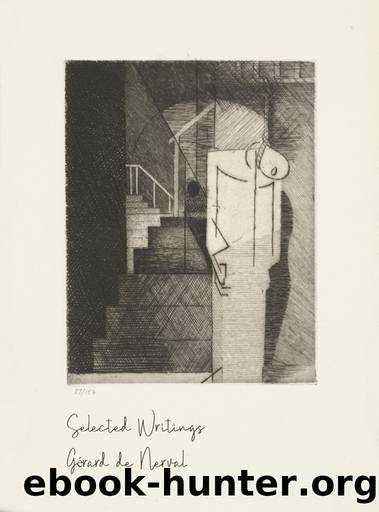Selected Writings by Gérard de Nerval

Author:Gérard de Nerval [Nerval, Gérard de]
Language: eng
Format: azw3
Tags: Classics, Letters, Poetry, Fiction, French Literature, Literary Criticism, Biography & Autobiography, Essays, Writing, Short Stories, 19th Century
ISBN: 9780141966618
Publisher: Penguin UK
Published: 1855-01-01T00:00:00+00:00
DIORAMA
This weekâs major dramatic event, and a novel and powerful one at that, was the reopening of the Diorama1 with its rendering of the Flood â a spectacular mystery play featuring Air, Earth, Water and Fire. Considered major characters in their own right in ancient times but now relegated to the status of fabulous entities, these four elements battle each other for world supremacy over the course of four acts, performing a most stupendous and impassioned quartet. Given the topic of the drama, however, the leading role goes to Water, that awesome humid element which Thales defined as the origin and end of all things, and which here threatens to annihilate the world in its very infancy and to eliminate all traces of life on earth except, that is, for the fishes of the sea.
Certainly not an encouraging state of affairs; indeed, we would be quite curious to see what the headlines of the Paris papers would say if these events were to befall us again and if, like the peaceful denizens of the city of Enoch, we were to witness a light shower gradually turning into a solid downpour and then into those cataracts of rain of which Monsieur Bouton has offered us such a fine tableau!
The city of Enoch, this antediluvian Paris, this city of ancient abominations, mentioned only in passing by the Bible, was originally built by Cain, who named it after his son.2 The latter should not be confused with that other Enoch, grandson of Seth, whom the Orientals called Edris and who shares with Eli and Melchizedek the great fortune of having disappeared from the face of the earth without actually dying. The city of Cain was the principal abode of that intermediary race of creatures whose iniquities were superhuman, given that it is still unclear whether these bizarre beings were the progeny of angels or of devils who had mixed with the daughters of men.
The Bible remains obscure on this point and the translations vary according to creed or religion. In the Hebrew original one finds the words BNI ELOHIM, which may be translated BNI (âthe sonsâ) ELOHIM (âof godsâ)3 â at least this is how it is read by Philo, by the Gnostics and Kabbalists, as well as by Court de Gébelin, Fabre dâOlivet and Lacour, the author of a curious book entitled Elohim of the Gods of Moses.4 To justify this literal translation, there are those who maintain that the name of the Elohim, that is, of the Gods, refers both to the principal spirit as well as to the higher God who was moreover called Adonai. Others, however, claim that this plural designation in fact referred to the Almighty inasmuch as he was a multiple entity; some have even gone so far as to suggest that Moses was a polytheist because he only speaks of the Creator in the plural. According to these commentators, the Elohim were none other than the Ammonite Gods represented on the monuments of Egypt as having shaped, modelled and fashioned all of creation at the behest of the first of the Gods among them.
Download
This site does not store any files on its server. We only index and link to content provided by other sites. Please contact the content providers to delete copyright contents if any and email us, we'll remove relevant links or contents immediately.
I Have Something to Say by John Bowe(3286)
What Happened to You? by Oprah Winfrey(1476)
Doesn't Hurt to Ask by Trey Gowdy(1402)
Einstein: His Life and Universe by Walter Isaacson(1319)
Solutions and Other Problems by Allie Brosh(1033)
Disloyal: A Memoir by Michael Cohen(1024)
American Dreams by Unknown(860)
Don't Call it a Cult by Sarah Berman(842)
Infinite Circle by Bernie Glassman(831)
Home for the Soul by Sara Bird(813)
Group by Christie Tate(811)
Talk of the Ton by unknow(736)
The Silent Cry by Cathy Glass(684)
Total F*cking Godhead by Corbin Reiff(666)
Severed by John Gilmore(656)
Searching for Family and Traditions at the French Table by Carole Bumpus(650)
The Battle of Mogadishu by Matt Eversmann & Dan Schilling(615)
Before & Laughter by Jimmy Carr(607)
Things I Wish I Knew Before My Mom Died by Ty Alexander(601)
